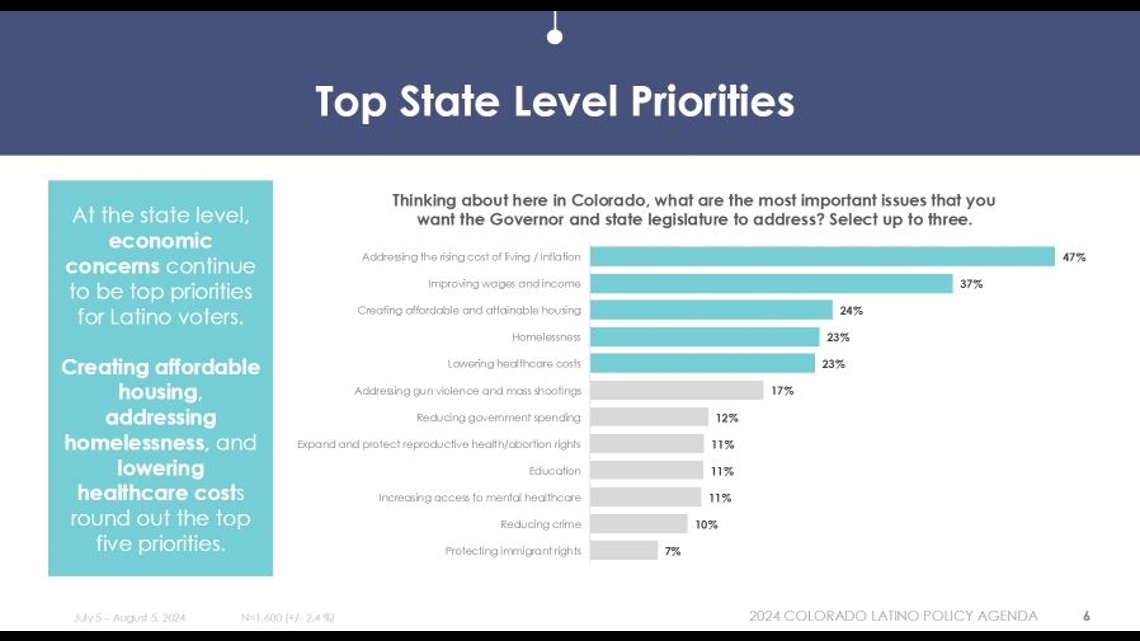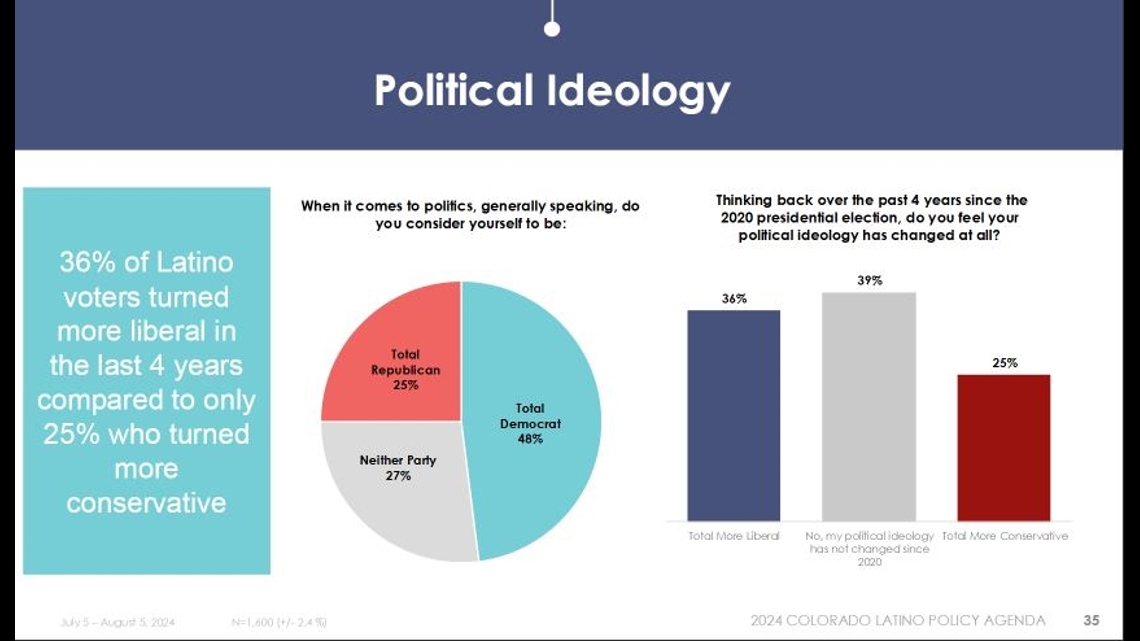Political science experts warn when Latinos make up a growing portion of the electorate across the country, now is not the time any party should be attacking them.
DENVER, Colorado — Speakers and a comedian at a rally for former President Donald Trump on Oct. 27 took aim at particular religious and ethnic groups.
Comments that focused on the Latino community garnered particular outrage on social media. Comedian Tony Hinchcliffe called Puerto Rico a “floating island of garbage” while also making a crude joke about Latinos having children.
The impact of Latinos, not only in Colorado but across the country, will be widespread this election as they are a growing portion of the electorate.
In Colorado, 22% of the state’s population identifies as Latino or Hispanic. Based on factors like eligibility and age, Latinos make up about 17% of all eligible voters in the state.
“Every 30 seconds in this country, a Latino turns 18 and is now eligible to vote because we were born in this country. That’s a big, powerful statistic,” said Alex Sánchez, president and CEO of Voces Unidas Action Fund.
Of the Latino voters in Colorado, about 65% are Mexican-American. The remaining number are smaller subgroups that include Puerto Ricans, Salvadorians and others from South America.
“When it comes down to any one particular group that may be swayed to get out and vote and change their preferences a little bit, it really does matter,” said Robert Preuhs, MSU professor and political science chair.
In light of the disparaging comments made about Latinos, it would more likely mobilize moderate voters to vote than flip a Republican vote to Democratic. The effect, if any, would be felt in swing states.
Preuhs says there are about 900,000 Puerto Ricans alone in swing states, not to mention those of other backgrounds. In Pennsylvania, there are almost 500,000. In an election expected to be incredibly close, those margins could impact the overall result.
“In swing states, it’s really going to matter,” Preuhs said. “We’re talking about margins. [It’s] probably not going to change people’s minds, but when you’re looking at a swing state like Pennsylvania, now you’re talking about one or two percent of the overall electorate. You know, we expect margins to come down to maybe half percent or less. That could have an impact.”
If Puerto Ricans do take offense to what was said at Madison Square Garden, it could mobilize Boricuas but also others who also share Latino background. Political scientists call this “linked fate,” a sense that comments made broadly against one group may impact others with a similar or common background.
Linked fate is also traditionally used to describe when members of an entire group put their individual interests behind those of the entire group. In this case: voting.
“I do think that Latinos in Colorado care about how we treat each other, certainly when we feel attacked. Certain Latino voters in Colorado will react. I think our data supports that,” Sánchez said. “I think we should believe when a politician says that he wants to deport you, we should believe them. We should believe that he wants to ban abortions because he has already done that in prior administrations.”
Voces Unidas Action Fund has done extensive voter outreach alongside Colorado Organization for Latina Opportunity and Reproductive Rights (COLOR Latina). In a nonpartisan research initiative, the two organizations polled 1,600 Latinos across the state of Colorado from July 5 to Aug. 5, 2024.
Latinos shared their top local concerns in the poll:
- Addressing the rising cost of living/inflation
- Improving wages and income
- Creating affordable and attainable housing
- Homelessness
- Lowering healthcare costs


36% of Latinos voters say they turned more liberal in the last four years compared to the 25% who say they turned more conservative. 48% consider themselves to be Democratic with 27% considering to be neither party, outpacing those who identify as Republican at 25%.
Despite how Latinos responded in the poll, there are more unaffiliated voters in the state who are Latino versus those who are registered as Democrat or Republican with the Secretary of State’s office.
“The largest partisan block of voters is Democrat. The second largest is Republican, but the biggest block of voters, period, is unaffiliated. It surpasses Democrats. It surpasses Republicans,” Sánchez said.


The data suggests that Latino voters in Colorado are not following the trends seen around the growing, where Trump has made new in-roads with Latino voters. Nationwide polling suggests that 2024 may see Latinos in the largest numbers yet vote Republican, but the data from Voces Unidas Action Fund and COLOR Latina show that Colorado Latinos are leaning in the opposite direction.
“One thing is for sure, we are not Florida. We are not Texas. So we are not seeing the big shifts in ideology year to year. Our data does not support that,” Sánchez said.
In all Colorado’s congressional districts, at least 60% of Latino voters said they felt 100% certain they would vote in this presidential election.
Colorado’s 8th District had the highest number of Latinos at 72% who said they felt entirely confident they would cast a ballot. CD8 is particularly important as it expected to be one of the determining races for the United States House of Representatives.








More Stories
In a first since 1938, Des Moines kids will trick-or-treat on Halloween
‘Halloween comet’ breaks into chunks after a close pass with the sun
Chilly with the first flakes of the season likely today in the Denver area